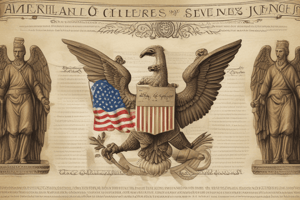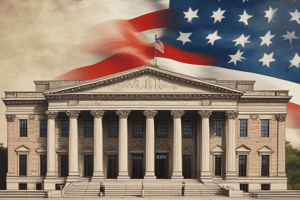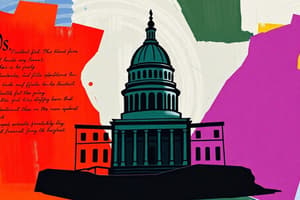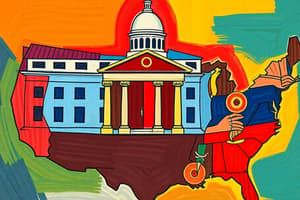Podcast
Questions and Answers
Which one was created first? Articles of Confederation or The Constitution?
Which one was created first? Articles of Confederation or The Constitution?
Which one of the two provides the framework for today's government? Articles of Confederation or The Constitution?
Which one of the two provides the framework for today's government? Articles of Confederation or The Constitution?
Name the 3 branches of government
Name the 3 branches of government
Legislative, Executive, Judicial
What does the Legislative Branch do?
What does the Legislative Branch do?
Signup and view all the answers
What does the Executive Branch do?
What does the Executive Branch do?
Signup and view all the answers
What does the Judicial Branch do?
What does the Judicial Branch do?
Signup and view all the answers
How many houses are in the Legislative Branch?
How many houses are in the Legislative Branch?
Signup and view all the answers
Describe the Federalist Arguments
Describe the Federalist Arguments
Signup and view all the answers
What is Federalism?
What is Federalism?
Signup and view all the answers
What is the Separation of Powers?
What is the Separation of Powers?
Signup and view all the answers
What are Checks and Balances?
What are Checks and Balances?
Signup and view all the answers
What is Popular Sovereignty?
What is Popular Sovereignty?
Signup and view all the answers
What does Ratify mean?
What does Ratify mean?
Signup and view all the answers
What is a bicameral legislature?
What is a bicameral legislature?
Signup and view all the answers
What is Impeachment?
What is Impeachment?
Signup and view all the answers
What does the 1st Amendment protect?
What does the 1st Amendment protect?
Signup and view all the answers
How many amendments does the Constitution have?
How many amendments does the Constitution have?
Signup and view all the answers
What is the minimum age requirement to serve in the Senate?
What is the minimum age requirement to serve in the Senate?
Signup and view all the answers
What is the minimum age requirement to serve as President?
What is the minimum age requirement to serve as President?
Signup and view all the answers
If elected to the U.S. SENATE, what is the maximum number of terms you can serve? How many years per term?
If elected to the U.S. SENATE, what is the maximum number of terms you can serve? How many years per term?
Signup and view all the answers
If elected to the President, what is the maximum number of terms you can serve? How many years per term?
If elected to the President, what is the maximum number of terms you can serve? How many years per term?
Signup and view all the answers
How many Supreme Court Justices are there?
How many Supreme Court Justices are there?
Signup and view all the answers
How many electoral votes are needed to win the presidency?
How many electoral votes are needed to win the presidency?
Signup and view all the answers
The legal voting age in the United States is
The legal voting age in the United States is
Signup and view all the answers
How many senators serve in the U.S. Senate?
How many senators serve in the U.S. Senate?
Signup and view all the answers
How many members are in the House of Representatives?
How many members are in the House of Representatives?
Signup and view all the answers
How many houses are in the legislature? (Congress)
How many houses are in the legislature? (Congress)
Signup and view all the answers
What does the first 10 amendments to the Constitution do?
What does the first 10 amendments to the Constitution do?
Signup and view all the answers
Which feature of the Constitution prevents one branch of the national government from becoming too powerful?
Which feature of the Constitution prevents one branch of the national government from becoming too powerful?
Signup and view all the answers
What is likely to be affected when census numbers show changes in a state's total population?
What is likely to be affected when census numbers show changes in a state's total population?
Signup and view all the answers
To bring charges against a government official for punishment is known as
To bring charges against a government official for punishment is known as
Signup and view all the answers
Why did the framers design a system of checks and balance?
Why did the framers design a system of checks and balance?
Signup and view all the answers
When are the two ways a bill actually becomes a law?
When are the two ways a bill actually becomes a law?
Signup and view all the answers
What was the 3/5 compromise?
What was the 3/5 compromise?
Signup and view all the answers
True or False: The U.S. Constitution is the law of the land in the United States.
True or False: The U.S. Constitution is the law of the land in the United States.
Signup and view all the answers
Study Notes
U.S. Government & Constitution Study Notes
-
Articles of Confederation vs. Constitution: The Articles of Confederation came first, but the Constitution provides the current framework for U.S. government. The articles had a single-house legislature, while the Constitution has a bicameral (two-house) legislature.
-
Branches of Government: The U.S. government has three branches:
- Legislative: Makes laws, composed of Congress (Senate and House of Representatives).
- Executive: Enforces laws, headed by the President and the Cabinet.
- Judicial: Interprets laws, headed by the Supreme Court.
-
Federalism: Power is divided between national and state governments.
-
Separation of Powers: Each branch has its specific powers and responsibilities.
-
Checks and Balances: Each branch can limit the power of the others to prevent abuse.
-
Popular Sovereignty: The people are the ultimate source of governmental power.
-
Ratify: To approve a document, such as a constitution.
-
Impeachment: To formally accuse a government official of misconduct.
-
Amendments: The Constitution has 27 amendments. The first 10 are the Bill of Rights protecting basic rights.
-
1st Amendment: Freedom of religion, speech, press, assembly, and petition.
-
2nd Amendment: Right to bear arms.
-
3rd Amendment: No quartering of soldiers.
-
4th Amendment: Protection against unreasonable searches and seizures.
-
5th Amendment: Right to due process, protection against self-incrimination, and double jeopardy.
-
6th Amendment: Right to a speedy trial, legal representation, and an impartial jury.
-
7th Amendment: Right to a jury trial in civil cases.
-
8th Amendment: Protection against cruel and unusual punishment.
-
Minimum Age Requirements:
- President: 35 years old.
- Senator: 30 years old.
-
Senate Terms: 6 years per term, maximum of two terms.
-
Presidential Terms: 4 years per term, maximum of two terms.
-
Supreme Court Justices: 9 justices.
-
Electoral Votes: 538 electoral votes are needed to win the presidency.
-
Voting Age: 18 years old
-
Congress Members:
- Senate: 100 members (2 per state)
- House of Representatives: 435 members
-
Bill Becoming Law: The bill must be passed by both the House and the Senate and signed by the President.
-
3/5 Compromise: Determined that enslaved people would count as 3/5 of a person for the purposes of representation in Congress..
-
Constitution as Law: This document is the supreme law of the U.S.
-
Census and Representation: Changes in state populations, as reflected in the census, can affect the number of representatives a state has in the House.
Studying That Suits You
Use AI to generate personalized quizzes and flashcards to suit your learning preferences.
Description
Test your knowledge on the foundational elements of the U.S. government and Constitution. This quiz will cover key concepts such as the Articles of Confederation, the three branches of government, federalism, and the principles of separation of powers and checks and balances.




